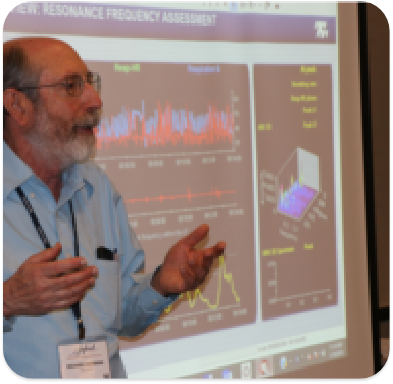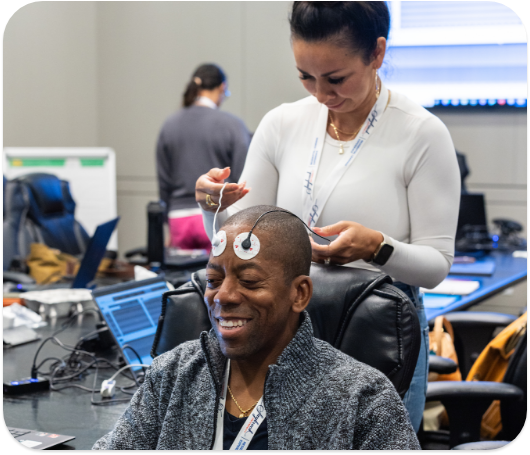Explore New Insights Into the Mind-Body Connection
Our online Ph.D. in Psychology: Psychophysiology Specialization places you at the intersection of mind and body and equips you with the capacity to optimize mental well-being through a comprehensive, rigorous study of the body’s behaviors and functions. The Psychophysiology Specialization program prepares you to use this advanced knowledge as a skilled researcher, educator, consultant, and more.
Within the curriculum, you will study the biological bases of human behavior, underlying physiological influences, psychophysiological interventions such as biofeedback, relaxation training, brain entrainment, and hypnosis, the insights into emotions, cognition, and behavior that brain activity provide, the neurobiology of stress and resilience, psychophysiological manifestations of trauma, and more.
This online psychology online Ph.D. program is not a clinical psychology program, nor is it designed to prepare students for future professional licensure. Students interested in such programs should consider admission to the Ph.D. in Clinical Psychology degree program.
Psychophysiology Job Outcomes
Upon completion, you will have an enhanced skill set and deepened perspective to augment your current practice or career. Additionally, with the appropriate licensure, if necessary,* you may expand into other roles, including:
- Private practice
- Military
- Corporate environments
- Education
- Consultant
- Biofeedback therapist
- Forensic psychophysiologist
*Our online Ph.D. in Psychology program is not designed to prepare graduates to qualify for clinical licensure or certification.
Other Psychology Programs
Interested in another specialization in psychology? We offer multiple doctoral programs that may align more closely with your goals.
- Ph.D. in Psychology
- Ph.D. in Psychology: Creativity, Innovation, and Leadership Specialization
- Ph.D. in Psychology: Consciousness, Spirituality, and Integrative Health Specialization
- Ph.D. in Psychology: Existential and Humanistic Psychology Specialization
- Ph.D. in Psychology: Specialization in Teaching and Advanced Research (STAR)
Program Components
Admissions Requirements
At a minimum, you must have received, or anticipate receiving prior to the start of the semester you are applying into, a master’s degree from a regionally accredited college or university before applying for a doctoral degree at Saybrook. Applicants for the Ph.D. in Psychology: Psychophysiology Specialization degree must submit the following documents:
- An official transcript from an accredited university demonstrating successful completion of a master’s degree, with a 3.0 GPA or better, though exceptions may be made
- Resume or CV
- Personal statement
Invest in Your Future
Saybrook University remains committed to keeping higher education affordable and accessible. Our Financial Aid Department is ready to offer guidance and support in determining suitable financial assistance tailored to your needs, including potential scholarship opportunities, grants, and more.
Cost
Saybrook wants you to have the information you need to make an informed decision about your academic and career aspirations. Our cost calculator provides an estimated cost of attending Saybrook to earn your Ph.D. in Psychology: Psychophysiology Specialization degree.
Sample Courses
Fundamentals of Psychophysiology
This three-credit course explores the manifold ways the brain and body work together to produce behavior and the cycle between behavior and physiology. The course begins with a description of the body’s organizational structure and genetics as related to behavior. The basic physiological ways information is received from the external and internal environments through a variety of sensors and then processed by the hormonal/nervous system is also described, as well as typical psychophysiological dysfunctions and interventions.
Basic Training and Education in Biofeedback
This three-credit course provides you with a basic skill set to conduct simple biofeedback interventions, along with knowledge about biofeedback concepts and approaches, and a familiarity with research-based applications of biofeedback to common medical and behavioral disorders. This course provides you with an introductory level of understanding helpful for engaging in biofeedback-based clinical practice and psychophysiological research in integrative health.
Psychophysiological Recording, Assessment, and Interventions
This three-credit course provides a basic understanding of the physiology and methodology underlying common psychophysiological recording techniques used in behavioral medicine including surface electromyography, electroencephalography, respiration, blood pressure, pulse rate, skin temperature, and electrodermal responses.
Catalog
Please refer to our academic catalog for more information on the Ph.D. in Psychology: Psychophysiology Specialization program.
Career Outcomes
Saybrook University prepares you to make an impact in a variety of high-demand careers. Below, you will find possible career options and salaries associated with this degree.
Data is pulled by a third-party tool called Lightcast, which includes data from sources including the U.S. Bureau of Labor Statistics, the U.S. Census Bureau, online job postings, and other government databases. The information below represents a regional and national career outlook related to this degree program*. Saybrook University is dedicated to assisting you in achieving your career goals.
*Many degree programs are intended to fulfill licensure requirements in specific states. The data shown here may not represent the state where you currently reside. For more information on how this program is applicable to the requirements of your state, please speak with your admissions specialist.
University Learning Experience
Our Ph.D. in Psychology: Psychophysiology Specialization program is a 100% online program. While the core of this program is completed asynchronously, there are some synchronous, online features designed to deepen your educational experience. We call this a Virtual Learning Experience (VLE). In addition to the VLE, you will begin your studies with a virtual Welcome Week. Welcome Week activities, including a program orientation, are held online during the week before the start of Fall and Spring semesters. The in-person Community Learning Experience (CLE) is also available for you to explore. The CLE is held every odd-numbered year. It is optional and not required to complete the program.

Psychology Faculty
Saybrook’s Psychology faculty are practitioner-scholars dedicated to advancing their field through continued practice and comprehensive instruction. Meet one of our faculty members below.

- Founder and director, Behavioral Medicine Research and Training Foundation
- Former president, Association for Applied Psychophysiology and Biofeedback
- Specialization coordinator, Psychophysiology at Saybrook University
UNBOUND: Humanistic Psychology
Designed for those who wish to contribute creatively to improving the human condition. Students are encouraged to explore complementary approaches—including meditation, nutrition, energy medicine, biofeedback, and spirituality—alongside more traditional forms of care.


Alumni Stories: Darlene Viggiano, Ph.D. (MFT)

Famous Athletes and Sport Psychology
Ready to Take the Next Step?
Submit an inquiry and one of our admissions specialists will connect with you to answer your questions and guide you through next steps.
























